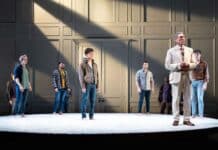If you’re a fan of improv, chances are you’ve heard of The Improvised Shakespeare Company®, who perform regularly in DC as they tour around the country.
But did you know that the District has its very own improvised Shakespeare group?

The Merely Players: An Improvised Shakespeare Show hits the Washington Improv Theater (WIT) stage on September 28 for a limited run of four consecutive Sunday performances at 7 PM. It’s part of WIT’s fall show series Laugh Riot: Comedy in the Face of Everything!, which started September 19.
The Merely Players are directed by veteran improv performer Shawn Westfall, who says his homegrown homage to The Bard packs the punch of a five-act play into a 40-minute spectacle.
He sat down with WIT’s Anna K. Nelson to talk about why audiences can’t seem to get enough of improvised Shakespeare in this capital city, where, one imagines, a good number of people go around thinking, “Don’t you know how important I think I am?”
Anna K. Nelson (WIT): Let’s start with the troupe’s name. Presumably, it’s taken from As You Like It?
Shawn Westfall: That’s right, from Act II, Scene VII: Jacques says this as a preface to his “seven ages of man” speech:
All the world’s a stage,
And all the men and women merely players;
They have their exits and their entrances;
And one man in his time plays many parts…
I love this speech because it corresponds to something I’ve long believed about identity, that we — all of us, not just “actors” — are playing roles constantly, and these roles shift over time and are sometimes forced upon us. I think recognizably “self-aware” people are more accurately “selves-aware” in that they understand this, as well as how a modicum of insincerity and “performance” is occasionally necessary for graceful human interaction.
And I love how comically the word “players” is diminished when it’s modified by “merely,” suggesting that players, i.e., you and me, are not, and never are, as important as we think we are in the grand scheme of things.
What made you want to start up an improvised Shakespeare group here in DC?

To be candid, DC’s seen its share of improvised Shakespeare already. A lot of us got hooked after catching Improvised Shakespeare at the Del Close Marathon in NYC — what, 20 years ago? We were like, “Wait, you can improvise a genre? Even THAT one?” To my mind, that show basically kicked off the whole genre-improv wave, and DC folks were eager to try a Shakespeare one. A few short months later, some of us — including WIT’s Artistic and Executive Director Mark Chalfant — cobbled together Crude Mechanicals for WIT’s annual festival of experimental improv called Improvapalooza. When I ran my own theater here in DC, I leaned hard into genre improv with an improvised Shakespeare structure as a tentpole show that I directed and performed in. Later, in Portland, Oregon, I joined former Philly improv-scene mainstay Kristen Schier’s Love, Shakespeare show, and once I was back in DC, Rails Comedy asked me to direct another improvised Shakespeare show — and of course I said “Yes.”
That’s the long answer, obviously. The short answer? I’ve loved Shakespeare ever since my undergraduate English survey class, and I’ve loved improv ever since I began performing it in the mid-’90s. For me, it’s two great tastes that taste great together.
Shakespeare can be challenging to perform on a good day (and without the added pressure of making the words and the plot all up in real-time while staying in character!). What are some particular challenges The Merely Players have faced as you’ve been rehearsing?
I mean, none, obviously! Why should there be any challenges whatsoever? Rehearsals are flawless and executed perfectly! Why do you ask this silly question?
(Just kidding, of course.) The primary challenge for us is narrative time. Shakespeare had the luxury of five-act plays into which he shoved a lot: characters, soliloquies, swordplay, romantic banter and bawdiness, ghosts, physical comedy, battles, marriages; scenes that changed locations quickly and by turns from, say, Rome to Cairo and back again. He also had audiences for whom this was their primary means of entertainment, essentially their “streaming service:” There was little else to do back then except go to a weekend Globe Theatre show and spend the afternoon drinking beer and seeing what this chatty, crazy Hamlet fellow is going to get up to next.
The Merely Players, on the other hand, have approximately 40 minutes to create a couple of characters, the worlds/milieus they inhabit, and then — without a script — find ways to bring these worlds together such that it appears “Shakespearean,” doing our best to incorporate the above. But it’s a tightrope that’s not only fun to walk, but fun for the audience to watch us walk. I think.
What are the most thrilling aspects of improvising Shakespeare? It must be quite a rush for the players!
Indeed, and a rush for their director as well! I always enjoy seeing how this cast’s unique individual skillsets flavor their choices, characters, and tropes. We have one actor who excels at high-status roles and naturally plays royalty and another who is effortless with rhyme and meter and rattles off soliloquies. We also have a performer who embodies lower-class characters with ease, plus a couple with deep Maryland Renaissance Festival experience, which proves invaluable. Another actor shines at physical comedy. The whole cast has sharp improv skills and remarkable memories, weaving audience suggestions into the show in ways I could never predict. Those in-the-moment discoveries delight the audience, the cast, and me — it’s a joy watching how much fun they’re having!

Shakespeare’s use of language, character, setting, and genre was so intentional that one might be forgiven for thinking it a fool’s errand to play with it to such a degree. And yet, improvised Shakespeare works so well. Why do you think that is?
It may be a fool’s errand to tinker with Shakespeare’s language, characters, and settings — but Shakespeare, a fool himself, did it often. He freely borrowed plots and lifted characters from numerous sources, altering them as needed for his own plays. His sources range from, among others, Holinshed’s Chronicles (the source of both King Lear and Macbeth) to even older versions of Hamlet like the 12th-century Amleth and the now forever lost Ur-Hamlet, written a few decades before his Hamlet. Copyright, in the sense we now understand it, didn’t exist, and plagiarism hadn’t been defined as we now know it. Later eras even rewrote his plays — Romeo and Juliet was, in the early 18th century, staged with a happy ending. The “doomed” lovers were no longer ill-fated but surviving and marrying instead! (I know, right?)
I think an improvised Shakespeare show works because — and please, don’t tell anyone this — we’re not really “improvising Shakespeare.” The Merely Players are parodying what people think Shakespeare is: lofty, inaccessible, “high art,” the bastion of intellectuals and the academy,performed by snotty actors who take the plays and themselves way too seriously. That’s what I love about it: parody is baked in. It knocks Shakespeare off that perceived pedestal and returns him to what he was in the first place — entertainment, not Art-with-a-capital-A. I can’t prove it, but I doubt Shakespeare ever thought of himself as an “artist.” He was an entertainer, and a popular one at that.
What would you say to someone who’s not a huge fan of Shakespeare as to why they should come out and see The Merely Players?
The cliché, pedantic answer is that even if you think you don’t like Shakespeare, you kind of do: the English you speak every day is packed with phrases he invented, and if you’ve enjoyed movies like The Lion King (Hamlet) or Ten Things I Hate About You (The Taming of the Shrew), you’ve enjoyed Shakespeare.
But here’s a better answer: Shakespeare wasn’t just an artist, as I said above. He was an entertainer — and a spectacular one at that, specifically in the sense of the word “spectacle.” He was the Michael Bay of his era. Think about it: his plays have sword fights, explosions, battles, music, murder, dance, flirty banter, groany and bawdy puns, royalty and rogues, mistaken identities, cross-dressing, lascivious jokes, and both physical slapstick-comedy and intellectually sharp wit. And, despite this entertaining spectacle, as the five-act play wore on, audiences — especially those standing on the ground of the Globe in the cheap “seats” — grew rowdy, drunk, and chatty to the point that they began talking back to the actors on stage. Thus, actors had to improvise — that’s right, improvise — in character while keeping the play moving. Oh, and that cheap-seat standing crowd? They were called “groundlings,” and that’s where the legendary improv troupe/theater The Groundlings got its name.
So don’t come for “Shakespeare.” Come for the fun, the spectacle, the laughter. And to see improv comedy’s roots.
The Merely Players cast features Catherine Mullins, Zach Myers, Meredith Garagiola, Emily Dalton, Keegan Cassady, Sammy Garcia, Matt Mansfield, JoJo Franzen, and Shawn Westfall.
See them perform at Washington Improv Theater on Sundays from September 28 to October 19, 2025, at 7 PM. (Each show includes a 25-minute opener by a DC-based indie improv troupe, followed by a 40-minute performance by The Merely Players.) General admission is $20. Shows take place at Studio Theatre, 1501 14th St NW, Washington, DC. Go to witdc.org/shows.
You can also catch them at Rails Comedy on these Tuesdays: September 30 and October 14, 2025, at 8 PM at The DC Arts Center in Adams Morgan, 2438 18th St NW, Washington, DC. Go to railscomedy.com.



